The Activities of the Japan Foundation
Language: Japanese-Language Education Overseas
Enhancing Overseas Japanese-Language Teaching Methods and Proficiency Assessments of Japanese-Language Learners
To further spread Japanese-language learning, it will be important to promote the international standardization of teaching content that raises convenience for Japanese-language learners and to upgrade proficiency assessments to help encourage learning. Accordingly, we implemented the following programs.
Holding of Japanese-Language Proficiency Test (JLPT)
Launched in 1984, the JLPT is the world's most popular Japanese test. In FY2019, tests were held in two additional countries, including Bhutan and the Republic of Benin, and 10 additional cities that include Shaoxing, Zhengzhou, Xinyang (China), Cagayan de Oro (Philippines), Salem (India), Ottawa (Canada), Salamanca (Mexico), Valencia, Las Palmas (Spain) and Kazan (Russia). This brings the total number of testing locations to 307 cities in 87 countries/regions, including Japan (47 prefectures). Also, the number of applicants in Japan and overseas reached 1,362,167, and 1,168,535 persons took the test as the number of applicants and examinees increases continually. Since 1984, the cumulative number of applicants in Japan and overseas has reached 14,397,803, and the number of examinees has reached 12,354,410.
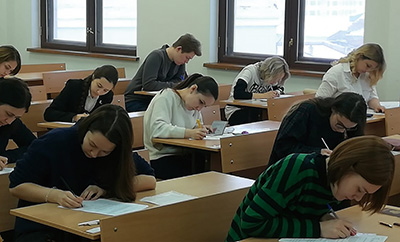
The JLPT held in Kazan (Russia)
Development and Operation of e-Learning
The Japan Foundation worked to upgrade content, improve convenience and enhance publicity of its Japanese-language learning platform, JF Japanese e-learning Minato, by opening the Kanji A1-1, Hiragana/Katakana (Spanish version) and Calligraphy courses. As a result, the number of users doubled from the end of the previous fiscal year to 141,681 users. Additionally, we completely redesigned the NIHONGO eな Portal for Learning Japanese to enhance its ease of use on mobile devices.

JF Japanese e-learning Minato
Disseminating Information about Japanese-Language Teaching Methods and Providing Teaching Materials
To promote the use of the JF Standard for Japanese-Language Education*, we disseminated related information via websites and SNS, and supported overseas local publishing of the standard-compliant teaching material Marugoto: Japanese Language and Culture as well as multilingualization of its supplementary teaching materials. We also developed the JF Can-do for Life in Japan and a new teaching material Irodori: Japanese for Life in Japan, and supervised the NHK WORLD-JAPAN radio program Easy Japanese.
* A framework for considering course design, class design and evaluations with an emphasis on developing "competence in accomplishing tasks" (the ability to use language to complete specific tasks) and "competence in intercultural understanding" (the ability to understand and respect one's own and other people's cultures)
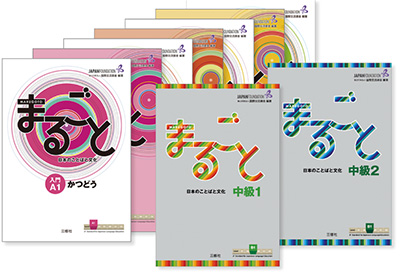
The Japan Foundation Japanese-Language Institute, Urawa
The Japan Foundation Japanese-Language Institute, Urawa was established in 1989 to comprehensively provide support for Japanese-language education overseas. Overseas Japanese-language teachers are invited for training programs on the Japanese language, Japanese-language teaching methods and Japanese culture. It also develops and provides teaching materials and implements programs to promote the spread of the JF Standard for Japanese-Language Education.
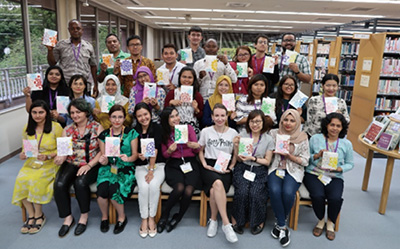
Japanese Culture Experience Workshop in Japanese-Language Program for Teachers of the Japanese Language
The Japan Foundation Japanese-Language Institute, Kansai
The Japan Foundation Japanese-Language Institute, Kansai was established in 1997 as a Japanese-language training facility providing support to Japanese-language learners from overseas. Foreign service officers, public officials and Japan specialists are invited to the Institute from various countries to receive training in specialized Japanese that is useful for their work duties and research; moreover, the Institute has training programs for learners from overseas. It also promotes the development of e-learning materials such as online Japanese courses, Japanese learning websites and apps based on the know-how it acquires through the training programs.
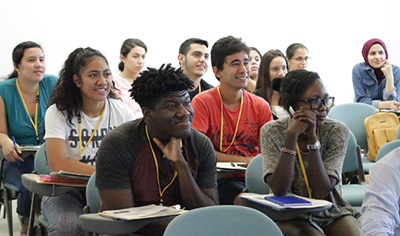
Japanese-Language Programs for Overseas Students
Japanese-Language Education Programs for New System of Acceptance of Foreign Human Resources
In accordance with the Comprehensive Measures for Acceptance and Coexistence of Foreign Nationals decided by the ministerial council in December 2018, the Japan Foundation launched support programs of Japanese-language education for foreign nationals designated as "Specified Skilled Workers." In collaboration with overseas offices, Japanese-language specialists and Japanese for Life in Japan coordinators who are dispatched from Japan, we implemented initiatives to support the effective and efficient acquisition of Japanese-language proficiency by people aiming to live and work in Japan. These initiatives are centered on the four pillars detailed on the right and target nine countries specified by the Japanese government (China, Mongolia, Indonesia, Cambodia, Thailand, the Philippines, Vietnam, Myanmar and Nepal). In addition, we have developed a new teaching material Irodori: Japanese for Life in Japan to support Japanese-language learning and released it online for free of charge.
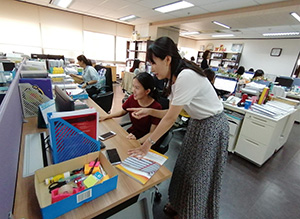
Japanese for Life in Japan coordinator (Thailand)
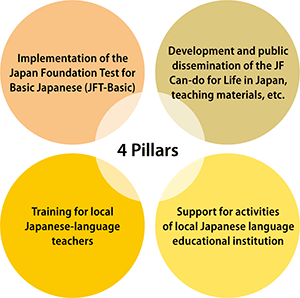
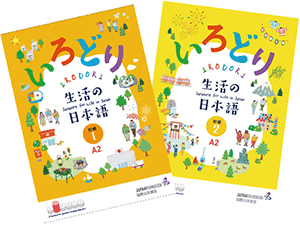
The new teaching material Irodori: Japanese for Life in Japan can be downloaded free of charge from our website.
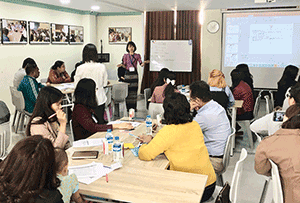
Japanese for Life in Japan coordinator (Myanmar)
Survey on Japanese-Language Education Abroad
To ascertain the current state of overseas Japanese-language education, every three years the Japan Foundation implements the Survey on Japanese-Language Education Abroad on a global basis. A tabulation of the results of the FY2018 survey confirmed that Japanese-language education has been implemented in 142 countries/regions, the most on record since the survey commenced in 1974. The survey also revealed that the number of Japanese-language educational institutions, teachers and learners all increased from the previous survey in FY2015 and that the number of Japanese-language learners throughout the world has reached approximately 3.85 million. The results of the surveys to date, including the FY2018 survey, are disclosed on the Japan Foundation website.
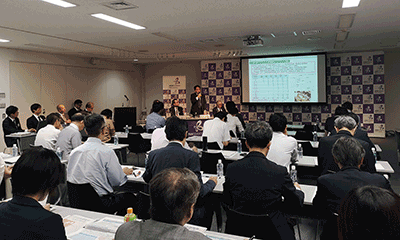
Press announcement of preliminary figures for the FY2018 Survey on Japanese-Language Education Abroad
